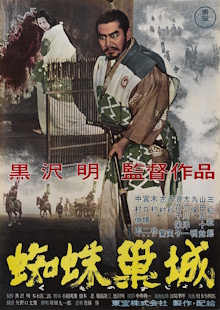We’ve watched Akira Kurosawa’s adaptation of King Lear a couple of years back, and now here is his version of Macbeth. Not only was this made nearly 30 years earlier, it’s a much shorter and simpler film. It makes significant changes from the original and eschews the Shakespearean language in favor of Japanese themes. Yet it is arguably faithful to the intent of the play and is widely considered one of the best film adaptations. For us, even though we already know exactly what will happen at every step, Kurosawa’s lavish production and the excellence of the acting ensure that the emotional impact remains potent.
When the lord who rules from the castle of Spider Web Forest is attacked by a rival, two of his samurai commanders Washizu and Miki successful repel the attacks. The lord recalls the two to the castle to be rewarded but they get lost in the eerie forest and encounter a spirit. The spirit predicts the rewards that their lord will give them and then foretells that Washizu will become lord of Spider Web Forest Castle but then it will be Miki’s son who inherits after him. Afterwards their lord rewards them exactly as predicted and Washizu starts taking the prophecy seriously. He recounts the story to his wife Asaji who urges him to seize power before Miki uses it against him. When the lord arrives at the garrison he commands, he reluctantly carries out his wife’s plan. Asaji brings poisoned wine to the bodyguards to put them to sleep and then kills his lord with a spear. The lord’s son manages to flee and Washizu succeeds at becoming lord by naming Miki’s son as his own heir to gain his support. Naturally this isn’t enough for Asaji who announces that she is pregnant and so Miki will need to be eliminated next.
You don’t have to already know Macbeth to tell how this is going to play out. The major plot points are the same and proceed exactly as you’d expect even transposed to the setting of feudal Japan. One important difference is that it sets aside Shakespeare’s political commentary on the legitimacy of rule, replacing it with the cycle of violence of each new lord coming to power by murdering the previous one. Of course it also does away with the traditional three witches with evil spirits who reinforce a more cyclical view of the tragic events. In doing away with Shakespearean lines, Kurosawa also removes much other dialogue. The film instead relies on facial expressions and body language to convey nuances of emotion and thoughts. As usual Toshiro Mifune is fantastic here. He broods with the best of them as he contemplates his wife’s malicious words and jumps up in panic at the sight of ghosts. The supporting characters are all equally good with the actor who plays Miki conveying suspicion without needing to say it out loud at all.
The excellence of the acting is complemented by the amazing visuals and especially the sets Kurosawa had constructed for this film. It’s somewhat surprising but the structure they built to represent the castle of Spider Web Forest was actually located on the slopes of Mount Fuji. Kurosawa selected the site both for the black volcanic soil there and its propensity to be foggy. Together with the Noh theatre influences, they fully complete the transformation of the Shakespearean play to something that feels genuinely Japanese. I enjoyed this much more than I’d expected simply because it was so perfectly made despite the material being familiar. It also helps that it isn’t too long while just being big enough to accommodate the needed battle scenes. It makes sense why this would be considered one of the best Macbeth film adaptations and I’d agree that it’s a masterpiece.
